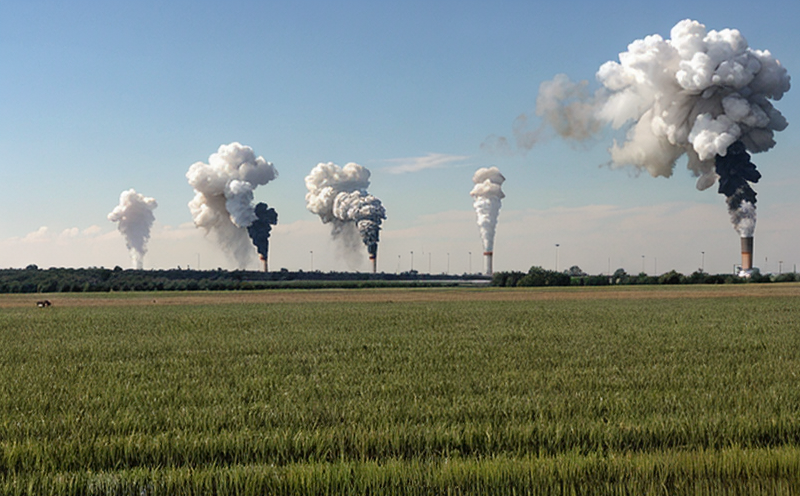EN 15662 Pesticides and POPs Residues LC MS GC MS Test
The European standard EN 15662 provides a comprehensive method for the determination of residues of pesticides and persistent organic pollutants (POPs) in various matrices, including soil, water, and food. This service is critical for ensuring that products meet stringent environmental regulations aimed at protecting human health and ecosystems from harmful contaminants.
The test procedure involves the extraction of residues using a combination of liquid-liquid extraction methods followed by cleanup steps like solid-phase extraction (SPE). The extracts are then analyzed using either liquid chromatography-tandem mass spectrometry (LC MS/MS) or gas chromatography-tandem mass spectrometry (GC MS/MS), depending on the specific target analytes and matrix. This dual approach ensures high sensitivity, selectivity, and accuracy in detecting even minute concentrations of these pollutants.
LC MS/MS is particularly adept at handling complex mixtures, allowing for precise quantification of multiple pesticides simultaneously within a single run. GC MS/MS excels with volatile compounds and can identify subtle differences in isomeric forms that are crucial for accurate identification. The combination of these techniques provides unparalleled sensitivity and reliability.
The acceptance criteria for this test are stringent, ensuring that only samples meeting the specified limits for pesticide and POPs residues can pass inspection. Compliance with international standards such as EN 15662 is essential for maintaining product integrity and market access in Europe and beyond. This service not only helps businesses comply with legal requirements but also enhances their reputation by demonstrating a commitment to environmental stewardship.
Our laboratory ensures that all tests are conducted using state-of-the-art instrumentation, including high-performance liquid chromatographs (HPLC), gas chromatographs (GC), mass spectrometers (MS), and automated sample preparation systems. These tools enable us to achieve the highest levels of precision and accuracy in our analyses.
Real-world applications of this testing include quality assurance for agricultural products, monitoring environmental impact from industrial activities, and ensuring the safety of consumer goods. By leveraging EN 15662, companies can protect their brands and ensure that they are meeting the stringent regulatory requirements set forth by international bodies like the European Commission.
For a deeper understanding of the testing process and its relevance to your business, we invite you to explore our detailed case studies and technical reports. These resources provide insights into how this service has been applied in various sectors and the impact it has had on improving product quality and environmental compliance.
Why It Matters
The identification and quantification of pesticides and POPs residues through EN 15662 are crucial for several reasons. Firstly, these contaminants can have severe health implications if not controlled properly. Exposure to high levels of pesticides and POPs has been linked to various diseases including cancer, neurological disorders, and reproductive issues.
Environmental pollution from these substances also poses significant risks to wildlife and ecosystems. Persistent organic pollutants are particularly concerning due to their ability to bioaccumulate in the food chain, leading to long-term health impacts on both humans and animals.
Compliance with EN 15662 ensures that products entering the market meet strict regulatory standards, thereby protecting consumers and preserving natural environments. This service supports businesses in maintaining a competitive edge by demonstrating their commitment to sustainability and quality.
Industry Applications
- Agricultural product testing for pesticide residues
- Environmental monitoring for POPs contamination
- Consumer goods safety assessment
- Industrial wastewater treatment effectiveness evaluation
| Sector | Application |
|---|---|
| Agriculture | Detecting pesticide residues in crops and soil |
| Water Treatment | Monitoring POPs levels in treated water supplies |
| Consumer Goods | Evaluating the safety of household products |
Eurolab Advantages
Our laboratory stands out for its commitment to excellence in environmental testing. We employ highly skilled scientists and technicians who are experts in EN 15662 methodology, ensuring accurate and reliable results every time.
We utilize cutting-edge instrumentation and software that provide enhanced precision and efficiency. Our state-of-the-art facilities offer a controlled environment where tests can be conducted under optimal conditions, reducing variability and enhancing the accuracy of our measurements.
Our strict quality control measures ensure consistent performance across all tests. We maintain compliance with international standards through regular calibration and validation procedures. This commitment to quality is reflected in our certifications from recognized bodies such as ISO 17025.





